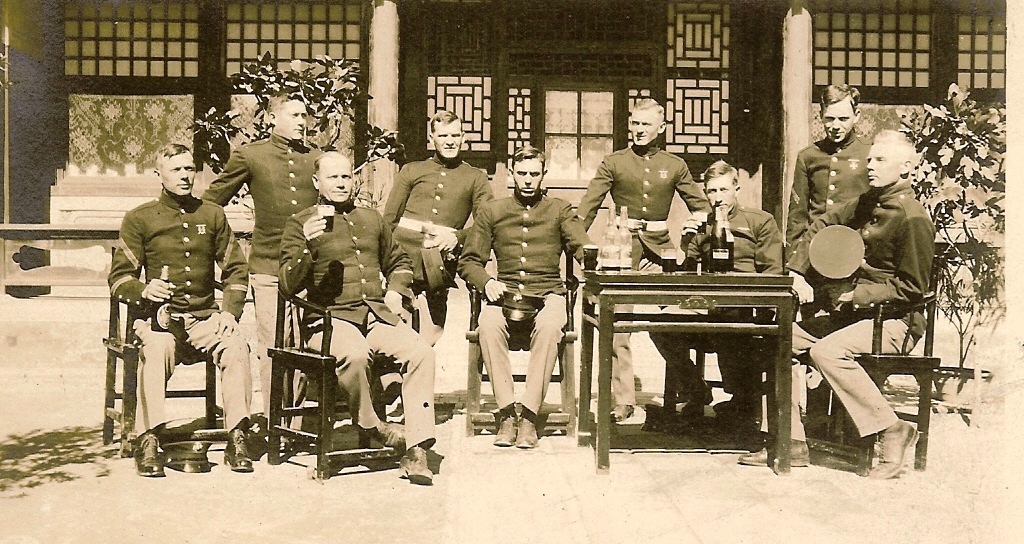
So often some enlisted man has to be a fool and make a lot of trouble for himself and a lot of trouble for other people.
-An excerpt from a China Marine Lieutenant’s letter to his parents c. 1914.
Within in days of the Marines September 1905 arrival in Peking, the American Minister took the opportunity to address the entire detachment. He stated China was a tough place to serve because there was not much to do and there were many temptations that could lead a man into trouble. But he expected the Marines to set a higher standard of behavior, and by their efforts, the other nation’s legation guards would come to admire and emulate them in deed. What he didn’t know as he spoke was there were already two Marines locked up in the Post’s brig for drunkenness! This section deals with the evils the American Minister alluded to, as well as organizations such as the YMCA that attempted to prevent the Marines from succumbing to temptation. Lastly, I’ll briefly address the relationship between the Marines and the expat occidental society, scattered throughout China that provided many of the amusements and activities the men found themselves involved.
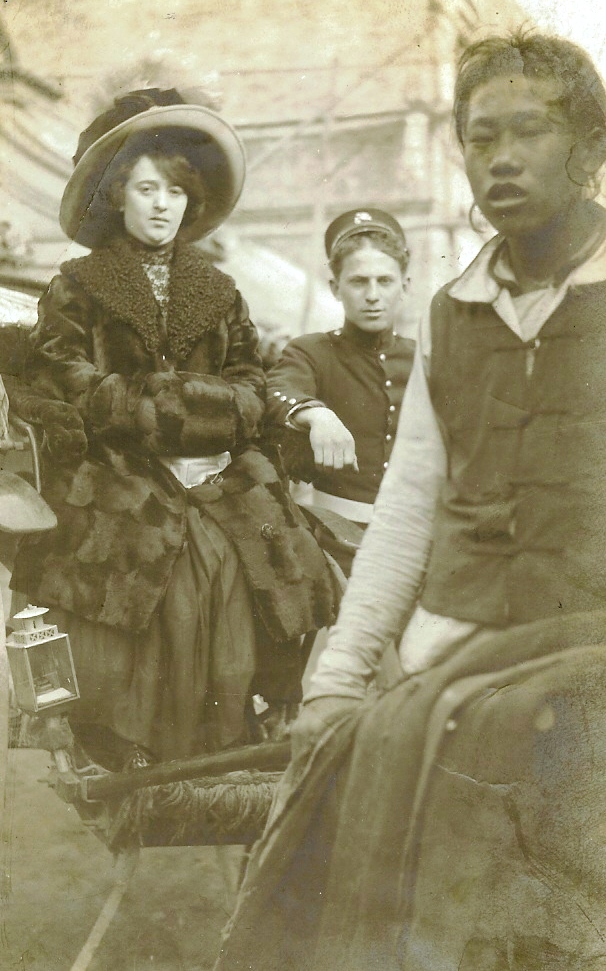
On liberty c. 1910-13
Women. A foreign officer once remarked that “women and alcohol are the causes of scraps between the men of the guards”, both of which could be acquired in China with ease. I’ve yet to find anything definitive on Marines fraternization habits with the locals during the early years of the past century. All the references I’ve found to date indicate the Marines pursued the few occidental women available in China. Young women would have come with their families who were involved in commercial enterprises along the Chinese coast, as dependants of diplomats, or to serve at a mission station. Worse, for a number of years before World War I, European and American prostitutes made a living working the China circuit. Gertrude Dayton, a rather dour looking 29 year old Ohioan, was such an example. Dayton, who claimed to be an actress, traveled to China in the summer of 1905, in the company of a Mrs. Whitney for a “two year tour” of the Far East. Suggestive postcards in her procession show her working in Hankow at some point and later ending up in the Philippines where she met a William Adsetts, formerly a Sergeant of the Legation Guard. Although Miss Dayton was supposed to be preparing to return to the States with a large amount of cash, she left instead with Mr. Adsetts for Hong Kong. Apparently after taking room in a Hong Kong hotel, they fought and Adsetts strangled her, stuffed her body in a trunk and fled north. Once the authorities identified him as a suspect, he was located and apprehended in the coastal city of Chefoo. Using his boxing skills acquired while in the Corps, Adsetts punched out the local constable and escaped. But he was soon apprehended and transferred to the Marines from the USS Galveston for safe keeping until he could be turned over to the Hong Kong authorities, tried and ultimately hung. Although Adsetts had left the Marine Corps in 1907, when papers worldwide picked up the story a number of them noted his past service as a Sergeant at the Legation in Peking.
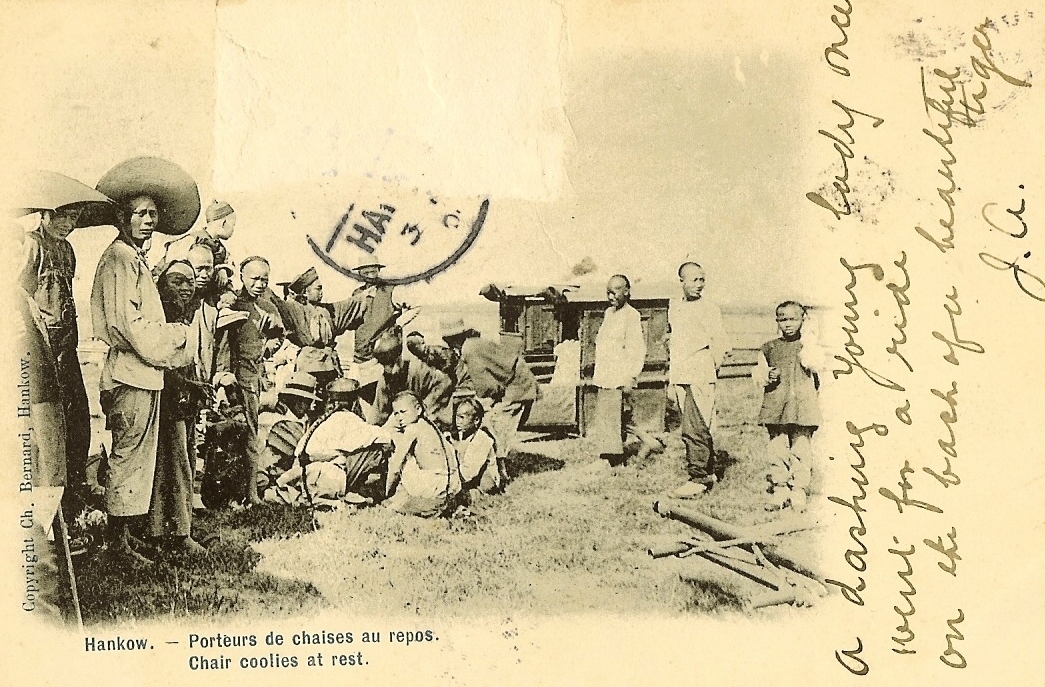
A postcard addressed to Miss Dayton. At the time she was in Hankow
Although we don’t know if Adsetts was remembered in Peking, we do know in 1908 future Marine Corps Commandant George Barnett noted the absence of pretty women in the city upon his arrival, but by the time he left two years later his opinions changed favorably. A few years later James Jodon noted he would often find a female companion and ride around the city while on liberty. Many years later in his book Salt Winds and Gobi Dust, Capt John Thomason wrote of a flirtatious relationship between an enlisted Marine and young French women hired to teach the Legation Guard Commanders daughter painting. If Peking’s growing assortment of available occidental women grew after 1908 it must have grown even faster in Shanghai which maintained a much larger foreign population…already in 1913 Shanghai was known for its clubs and social life that would only increase following the First World War.

Shanghai Cabaret Performer
The war bought other changes as well, an influx of available Russian women. After the Russian Revolution, a large number of Russian refugees who had supported the losing side settled all along the Chinese coast. Many of these people came with nothing and needed to acquire the means to support themselves and their families. Although teaching piano or dancing might provide some income it was not as lucrative as other professions. The night clubs of Shanghai and to a lesser extent Peking and Tienstin always needed cabaret performers. According to Sgt Maj Charles Jackson in his book “I am Alive” one old China hand noted “the man who shacks up with a White Russian has generally one or more things happen to him-he gets a court-martial, a social disease or married.”


Shanghai Girlfriends
Further along the scale was Shanghai’s Chinese girl guides who could be rented by the hour, the day or longer. These guides were not shy about approaching Marines at a restaurant or club and offering their services directly. Of course there were brothels in all the locations were the Navy operated. In 1910 a naval report noted a very high rate of “working” women in Shanghai had venereal disease. Because of the dangers of disease from these women, the navy issued condoms to men going on shore leave and later in the century the Marines developed a system to closely monitor their men’s health. In Peking there were two medically approved Houses, numbered “37” and “40.” Daily, a Navy Corpsman from the Post hospital would drop off a supply of condoms for the men to use while visiting. In addition, upon returning from Liberty, each Marine was required to verify in writing whether he had sex and if so, did he use a condom. Failure to report truthfully could result in additional time added at the end of one enlistment or illness and death. Of course there were other options for gaining female companionship in China. One pre-war China Marine told me, a simple arrangement could be made where a Marine might acquire a permanent girlfriend, whom he maintained in an apartment called a “Boars Nest” for the price of a apartment and subsistence for the woman and her family. In his case, he was approached while on guard duty by a young Russian woman who signaled her intentions. Following his duty he followed her back to her apartment and an “arraignment” made. In his words they both had needs and this worked well for both of them. Of course relationships developed with oriental women as well.
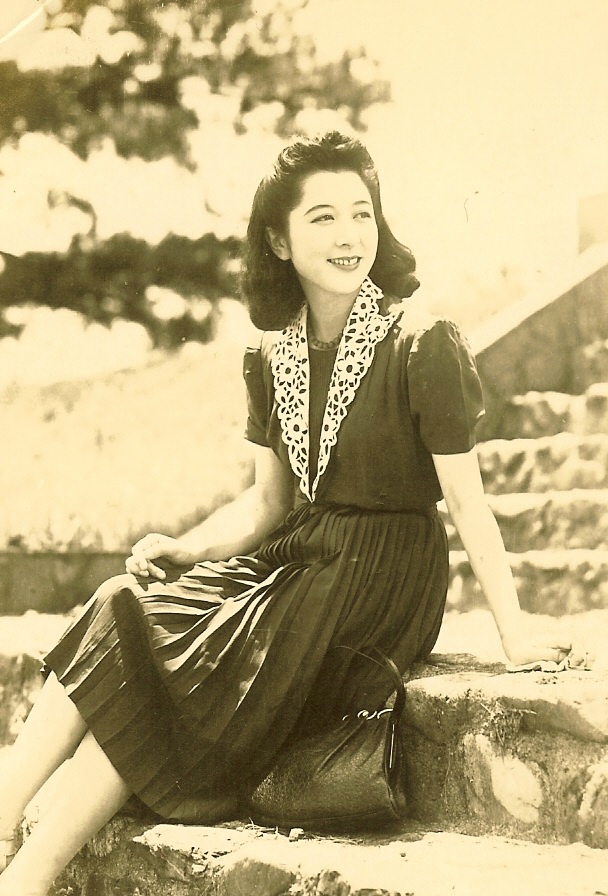
A Marine's friend
Korean and Japanese women served as early companions for both sailors and Marines in the northern ports of Chefoo, Tientsin and the capital of Peking. Furthermore, as a result of the reordering of Chinese society after the 1911 Revolution, Chinese women now found, or were forced out of necessity to enter in to professions that allowed intimate contact with the Marines. With names like Lilly Wong, Plain Lotus Chang and Pleasure Pleasure Wong printed on business cards they could be found be found in all the locations Marines were expected to visit. Although many women hoped to benefit financially from the Marines, very few occidental or oriental women during the pre-WWII period could hope their liaisons would lead to marriage and a trip to America. That did not stop a number of them from trying to receive formal monthly allotments from these men. The 4th marine publication Walla-Walla is filled with cartoons or stories with the line “Hey Moline [Marine] you give me monthly allotment?”
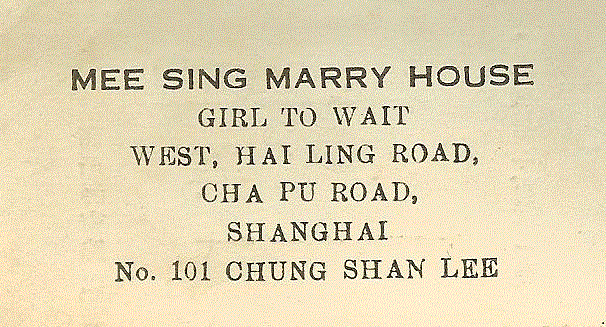
A typical business card for a Shanghai bar that catered to sailors and Marines
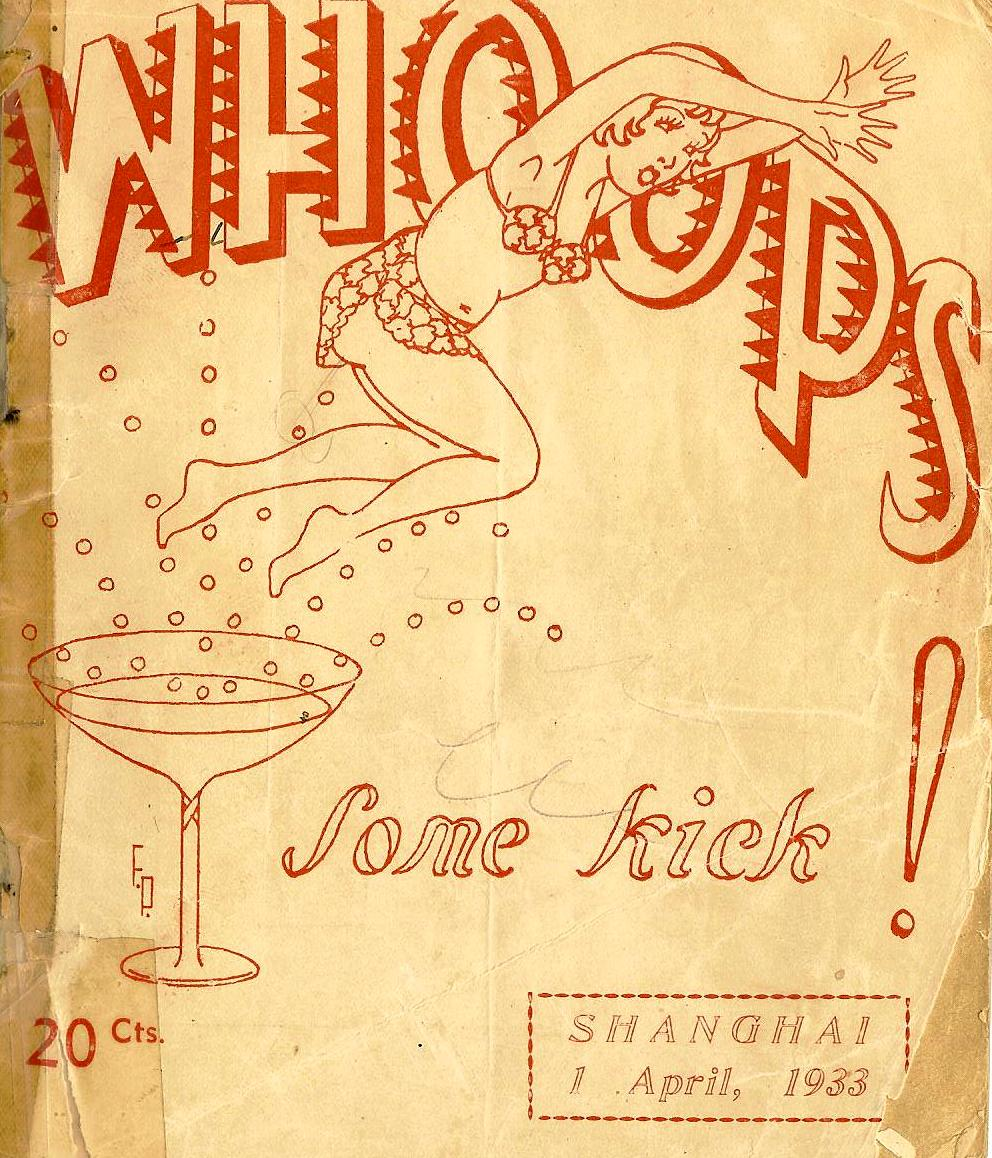
A short lived publication by a Marine who ended his cruise in Shanghai to publish a sailors and Marines guide to the night life of Shanghai. This small magazine was filled with off color jokes and pictures, as well as advertisements highlighing various Shanghai clubs.
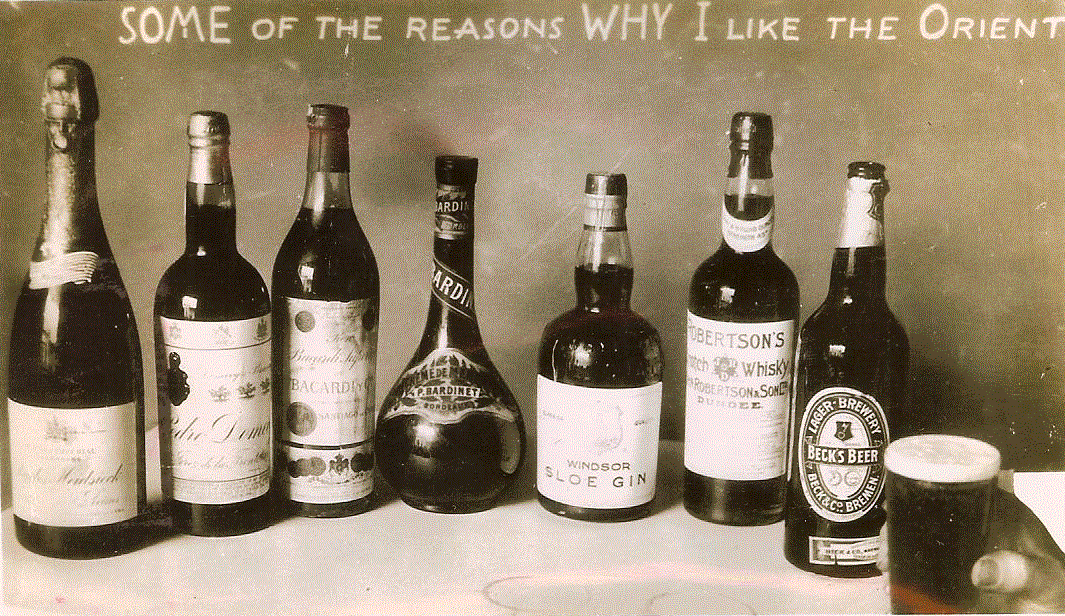
A popular themed post card from the 1920's. There are several different variations of this image that appears in Marines scrapbooks: one highlights China specifically and another version that highlights the Philippines. A thrid version exisits where the photos of the bottles were taken aboard a ship

A Marine's view of China, c. the early 1920's
Alcohol and other refreshments. Robert Johnson in his book Far China Station quoted a US Navy Capitan who while investigating alleged misbehavior by US Naval personnel, circa 1894 noted “men who do not get drunk are not plentiful in the Navy and Marines.” With the dollar increasing it's strength against other currencies during our period of interest, it was no surprise that the average Marine who drank could indulge in said activity for a reasonable amount of money. Another advantage to Asiatic duty was the ability to drink despite Prohibition. Although Prohibition may have “outlawed” alcoholic beverages in the Legation compound and other Marine manned posts in China, that didn’t stop the Marines from consuming just outside the gate. In fact, the ability to obtain alcohol cheaply was one of the advantages to duty in the Far East. A Marine writing home in 1933 from Shanghai noted a quart of the finest beer was seven cents and a quart of bonded whiskey thirty cents. Each region of China had their own local beers. In Shanghai, the Marines favored Union Brewery (or UB as it was popularly called) followed by Lion or Asahi, from Japan. In Peking, it was So Ho Shin. It seemed the only severe consumption vice a Marine could commit was drug use. One pre-World War One Marine was noted in the Legation Guard’s muster rolls for using cocaine and that got him arrested and quickly sent home for “deviant behavior” and jail time. Other Marines in the 1930’s when suspecting drug use, were not above anonymously turning in their bunkmates.
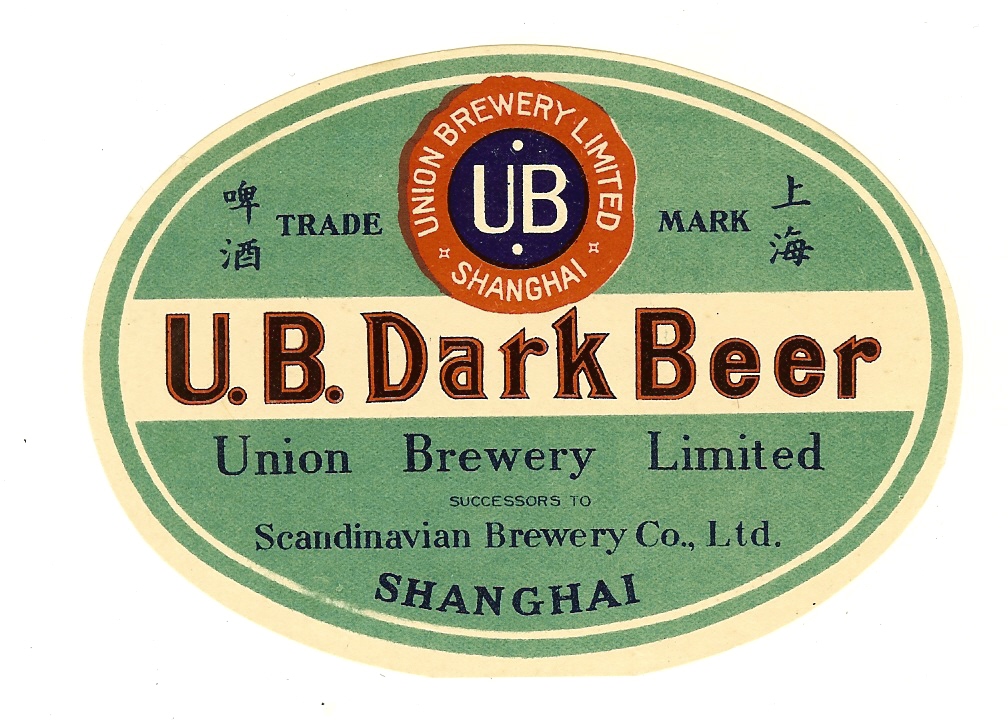

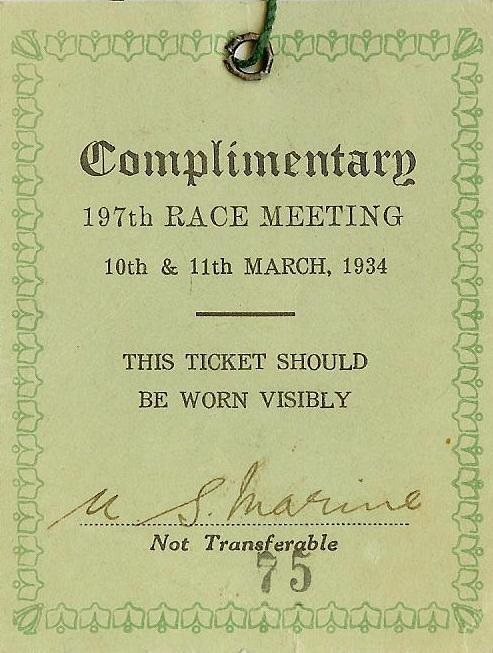
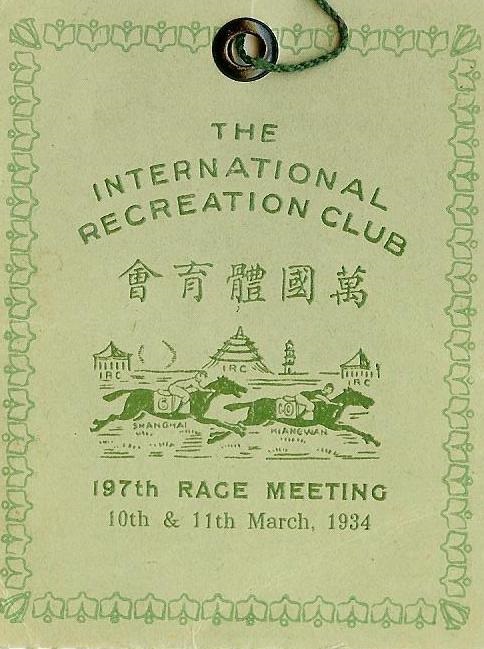
Complimentary horse racing ticket given to a Shanghi Marine and hung on the front button of coat or uniform.
Wholesome Pursuits.
The Corps was not unaware of temptations China offered and took steps to keep their men combat ready. Parades, inspections, drills, field exercises, training classes and endurance marches helped keep the men mission focused. In both Shanghai and Peking it became custom that following lunch the men on normal duty days were expected to engage athletics. Participation in various athletic programs was done on the honor system and the men did for the most part comply. In Shanghai the list of sports included rugby, basketball, baseball, track, tennis, volleyball, swimming, bowling, handball, hai alai, kendo, badminton, polo, fencing, wrestling and boxing.

Peking Marines on a winter hike. Note the goggles being worn to protect the men from blowing dust
The Peking list was almost as inclusive. Alongside inter-command competition, opponents included local teams of expats, university students and visiting teams from the Army’s 15th Infantry or from ships of the Asiatic Fleet. Of course big rivalries formed such as when the 6th Marines arrived in Shanghai to augment the 4th Marines, and they met for a Thanksgiving Football game or the Asiatic Fleet would come to Shanghai for a boxing tournament against the Marines.
In Peking a big event held every October was the Legation Guard games. This is when all guard forces from each nation (except it seems from Japan) would compete in a series of track and field events. This meet, most likely originated by the British shortly after the relief of the Legations in 1900, saw the Americans dominate for almost the entire period before WWII. A highlight was the tug-of-war competition that in the last years of these games pitted the Marines against the Italian Guard force of specially selected men of great strength and height.
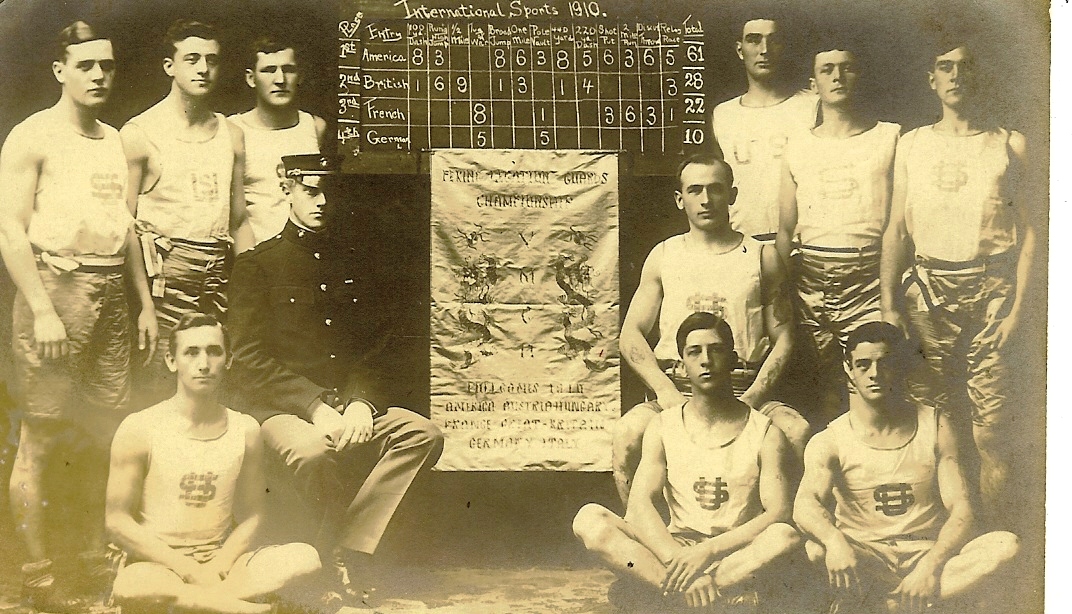
US Legation Team International Track Meet, 1910.
Another tool available to keep the men focused on purer pursuits was the YMCA system. Both the Legation Guard Y and the Navy Y in Shanghai provided the men a clean place to dine outside their billets. In addition, they offered current US magazines, movies, language and Chinese cultural classes, formal dances and tours of the surrounding area. In 1928 the Peking Y started a series of tours that ranged around the Peking area and as far north as the Great Wall. In Shanghai the Navy Y arraigned a popular boating trip to the town of Soochow as well as down to witness a tidal event at Hangchow.

Legation hockey team. c. 1932

4th Marine's starting football team. c. 1936-37

Legation baseball team c. 1916
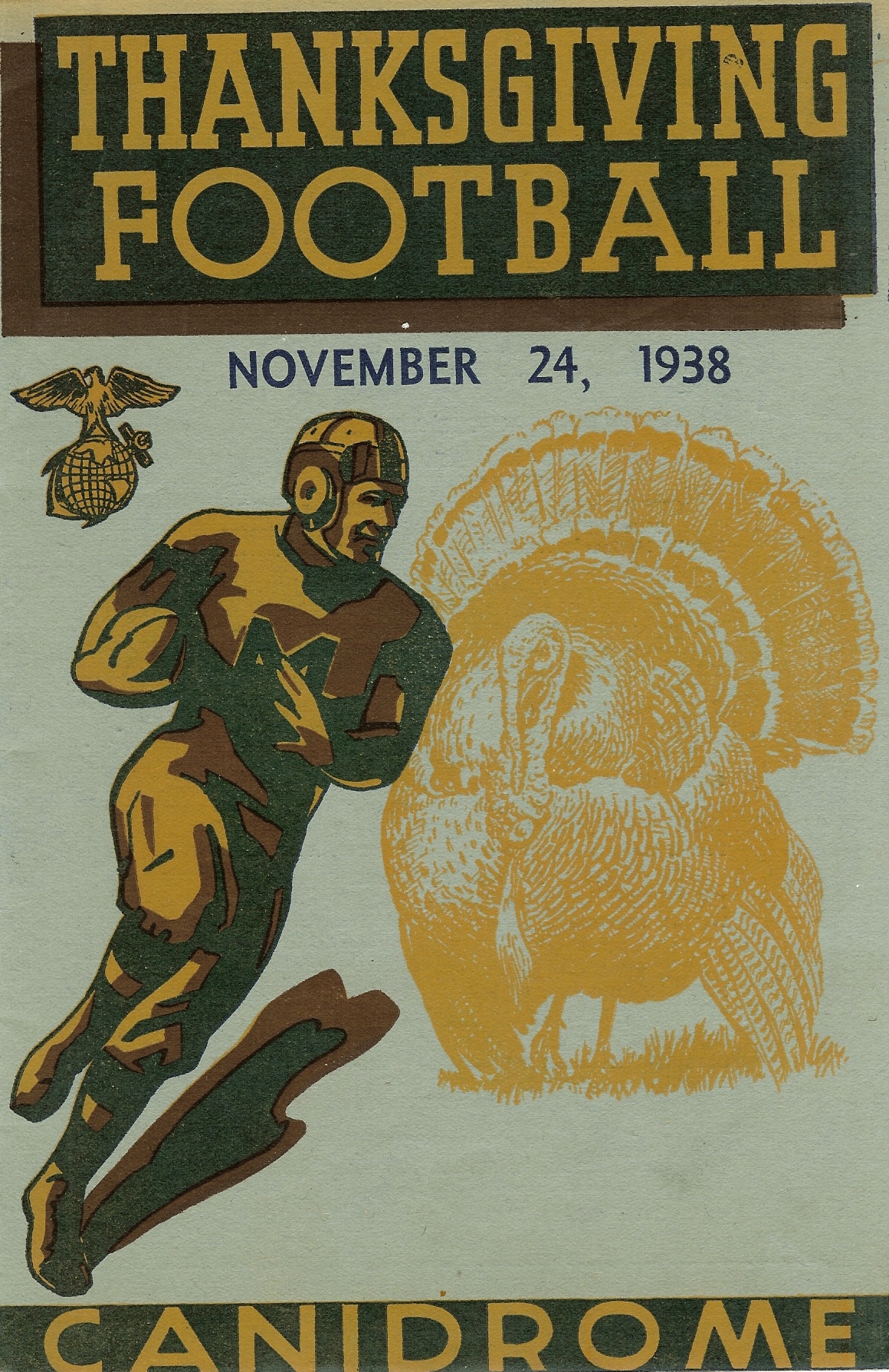
Program for the annual Thanksgiving Day Football game.
Furthermore, since the 4th Marines lacked a central compound the Navy Y provided facilities like a gym and large swimming pool. In 1937 when fighting between the Chinese and Japanese forced the Marines into dugouts along the Soochow, it was civilian Y volunteers that kept them supplied with drinks, books and writing paper. A final interesting note on the Shanghai Y: they, like their Peking counterpart offered a series of “Talks on China.” In Shanghai the lecture series was conducted by a Mr. and Mrs. B.W. Smith. These talks included such topics as animal and plant life, biographies of famous Chinese people and the county’s history. They also included for the 1938 lecture season a talk on “Shanghai Girl Guides” which really served as a primer for navigating the world of Chinese escort services! Noting these young girls could be had for a dollar an hour (local currency), one could rent their services for a day or longer…and what you did was between you and your guide. It is hard to imagine a room full of sailors and Marines at the “Y” being told by the Smith’s “The success of a day’s fun rests solely with your initiative for the girls are willing to step out high, wide and handsome any time of the day.”
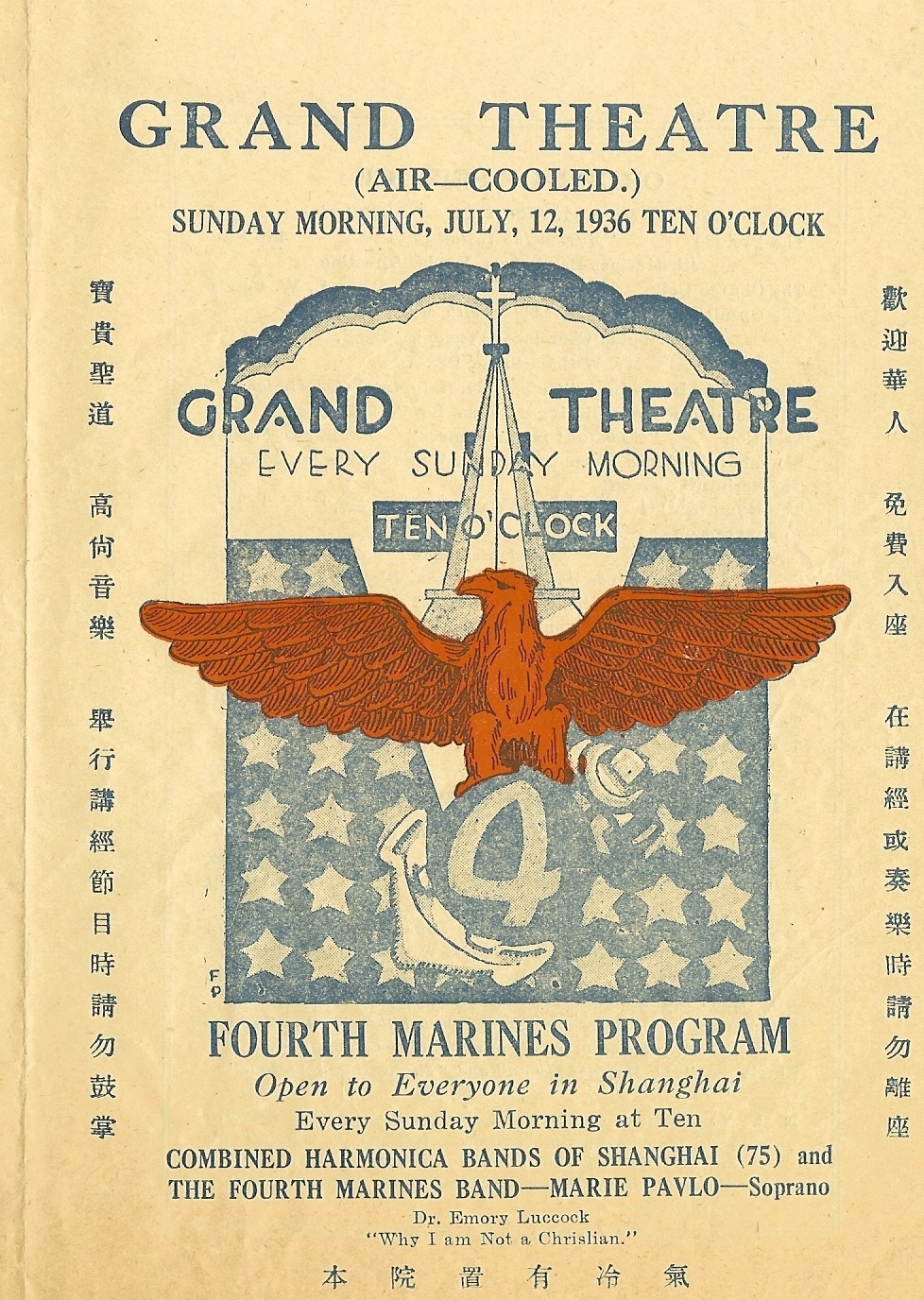
A Church of the 4th Marines Flyer
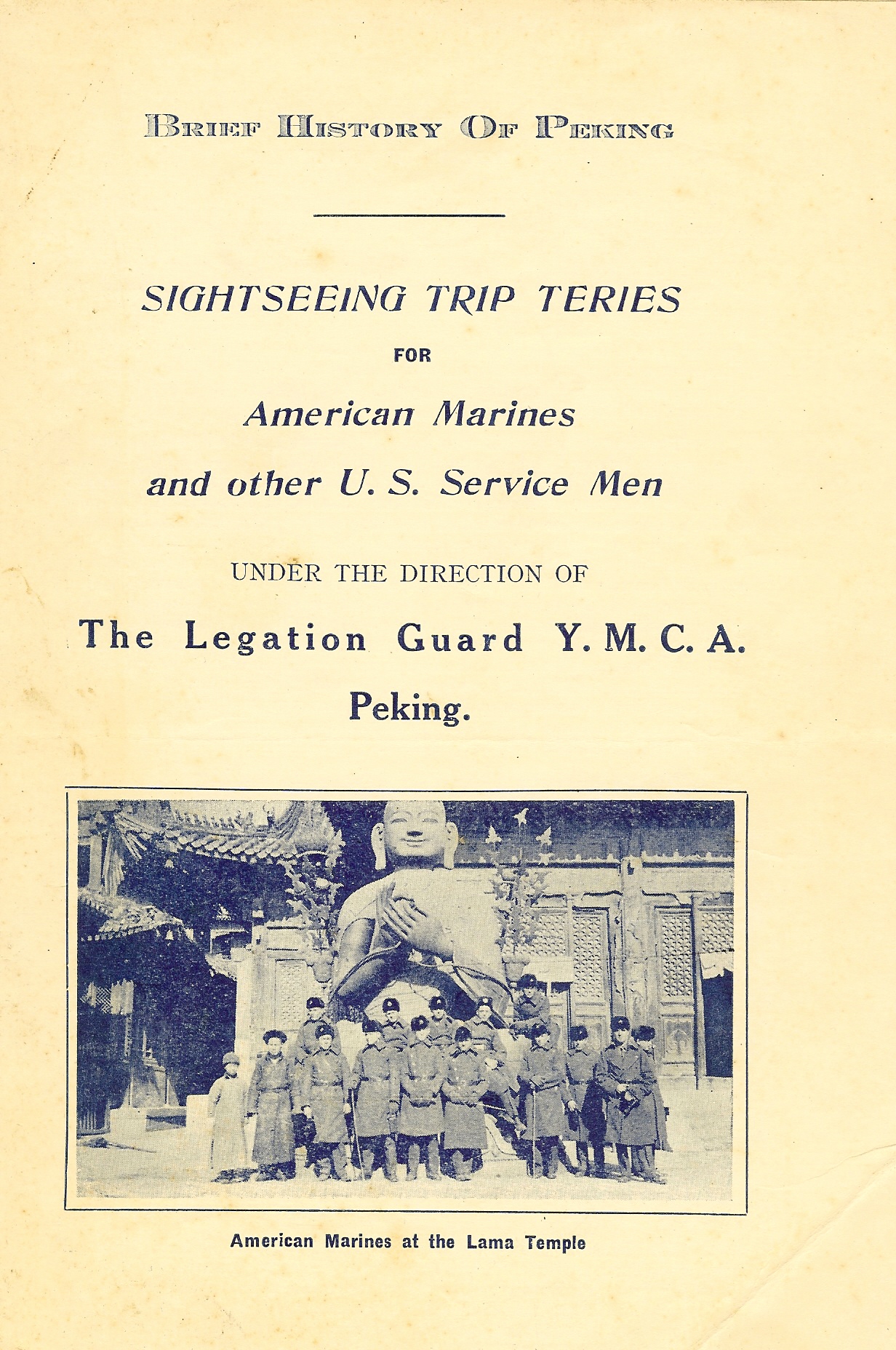
The Marines did not maintain a Chaplain corps. Instead, Navy chaplains were expected to meet their spiritual needs. But since their numbers were too small to rate a Navy Chaplain, the spiritual needs of the Legation Marines were met by attending local services at a number of churches in the city run by American missionaries, the British community or the French community.
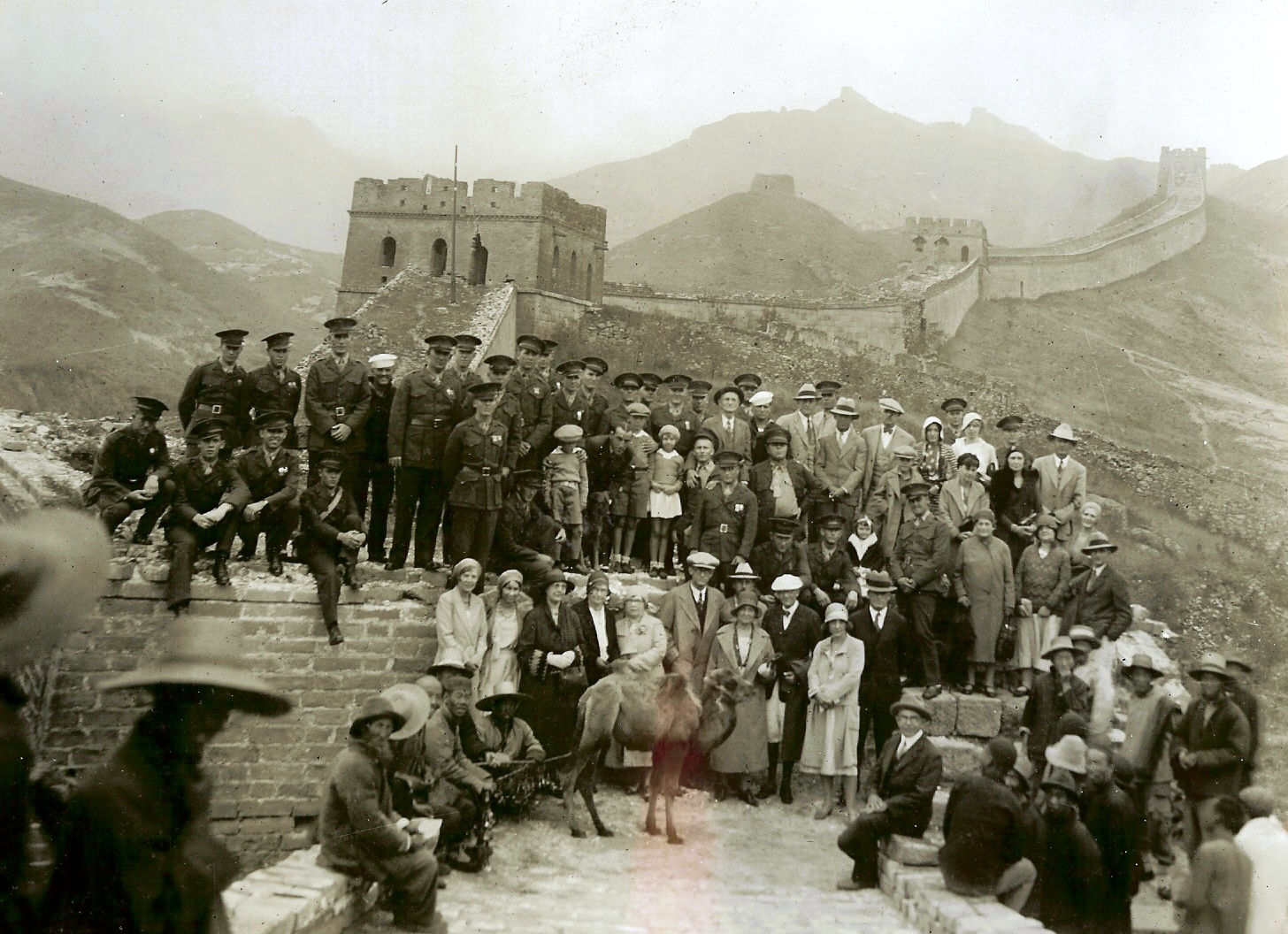
In Shanghai where the number of Marines was at least double in number, a Navy Chaplain was permanently assigned. The 4th Marine Church was organized in 1928 by Chaplin W, R. Hall. Hall found that since the 4th was scattered in billets across Shanghai instead of coming to each billet to preach he found the Embassy Theater on Bubbling Well Road as an ideal location to hold services. In time the Church grew in popularity not only with the men but also the local expat community. Featuring performances by the 4th Marine band and other local talent over 200 civilians sat alongside the Marines each Sunday. Local newspapers printed their sermons and they established a relationship several homes and schools for underprivileged children. For Christmas, the Church would throw a party for these children and hand out toys, not unlike today’s Marine program “Toys for Tots.”
Service Clubs. As early as 1910 the Marine enlisted men banded together to form a service club. This type of club was command sponsored for both Privates and NCO’s. Clubs in Peking, Shanghai, and later in 1938 in Tientsin were located off post, but received some type of subsidy from the sponsoring detachment or regiment. Despite being a money loser for the Mari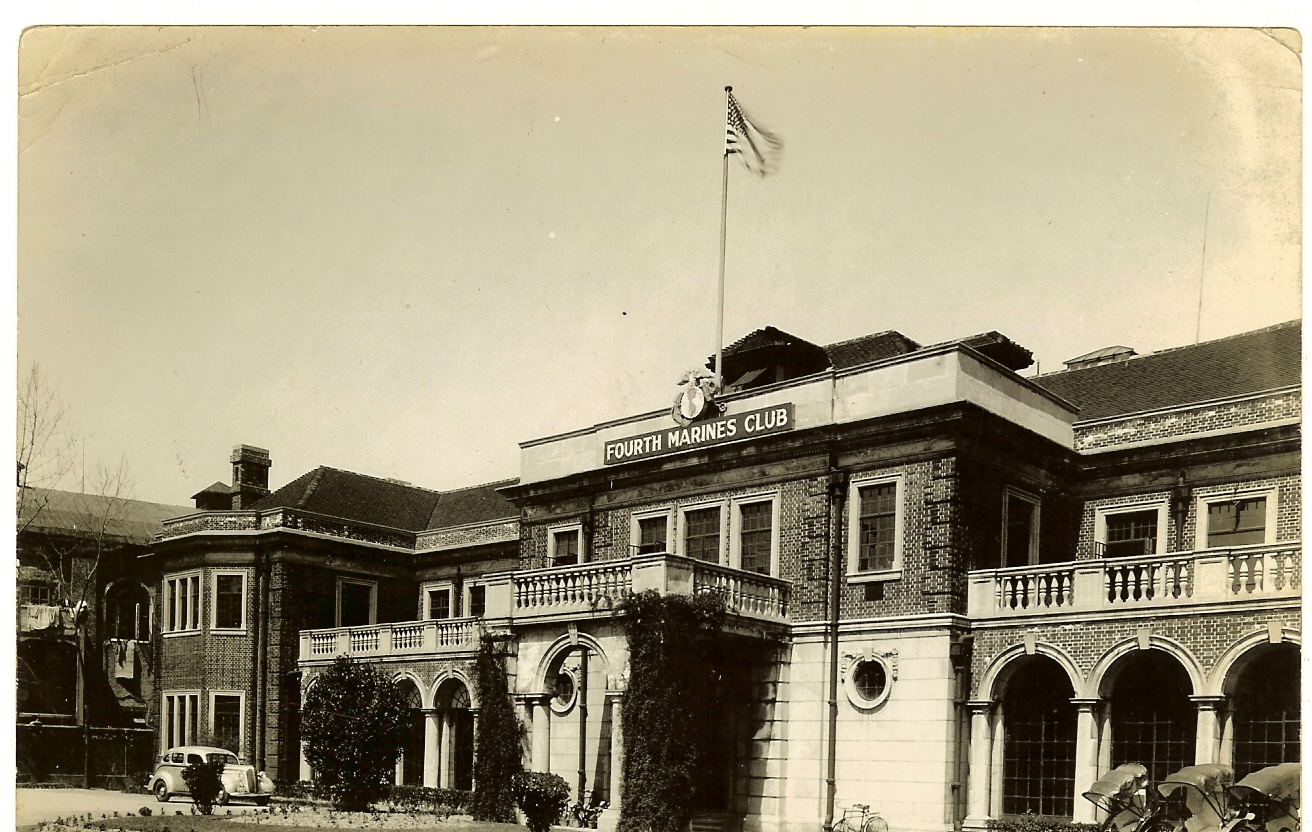 nes, they did provide a clean place to eat and drink at reasonable prices. Furthermore, the clubs offered dancing, a live band and other forms of entertainment. Membership was based upon monthly dues and payment for services (drinks, meals) was handled by a “chit” system.” Chits were IOU’s that a Marine would sign for each time he ordered anything at the club which was then recorded in the man’s club book. Payment in full was expected at the start of each pay period. Usually these clubs were used as “staring points” for an evening out…a low cost meal at the club then it was off to a cabaret or other more thrilling destination.
nes, they did provide a clean place to eat and drink at reasonable prices. Furthermore, the clubs offered dancing, a live band and other forms of entertainment. Membership was based upon monthly dues and payment for services (drinks, meals) was handled by a “chit” system.” Chits were IOU’s that a Marine would sign for each time he ordered anything at the club which was then recorded in the man’s club book. Payment in full was expected at the start of each pay period. Usually these clubs were used as “staring points” for an evening out…a low cost meal at the club then it was off to a cabaret or other more thrilling destination.
Missionaries.
Another religious group the Marines repeatedly encountered was missionaries. Generally speaking Marines and missionaries did not mix well. A common Marine refrain, echoed by China Marine George Howe during a February 2008 interview was “they did things over there that the nations that sent them over were unaware. They lived the "Life of Riley" and it was a real waste of money trying to convert the Chinese, they had 6,000 years of civilization!” Sallie Lytle, wife of Pay Officer John Lytle writing, in 1931 was even blunter:
“The missionaries are only ones who get their heads cut off and they usually deserve it, for they cause all of the trouble between the Chinese and the foreigners…the missionaries get into trouble in every country they go, then they yell for protection and the Marines have to go. During the Boxer uprising (caused by them) they didn’t fail to flock into the Legation, but they refused to fight as it was against their religion, but they ate and drank the food and supplies from the Marines who had to fight for them for ten weeks without sleep, for their protection.”
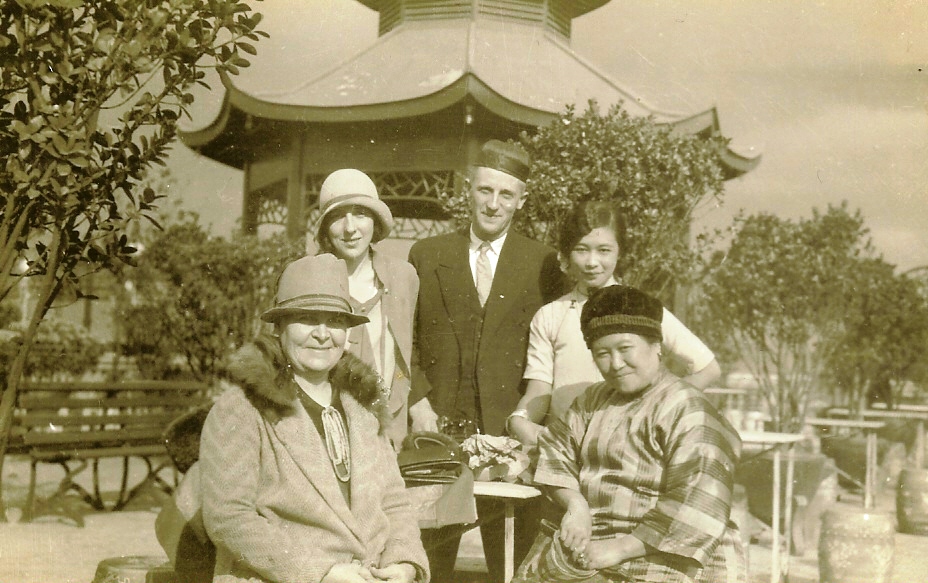
Fred Hartness with "Mother Lawler" and fellow missionaries, Shanghai
Of course there exceptions to these harsh views such as in the case of Pvt Fred Hartness who while in Shanghai happily got involved with a Pentecostal missionary group during his China cruise and found a strong kinship with the matron of that Shanghai society. Another Marine, Claude Curtis left the Corps in Shanghai to serve as a missionary in China for a number of years.
ExPats. Alongside missionaries stood a number of expat’s who were drawn to China for business, teaching, or study. In addition, a number of well off occidentals during this period made China a must visit travel destination. So many in fact, that in the mid-1930’s that the Embassy staff issued a city travel guide with the reminder that the Marine Quartermaster was not responsible for mailing souvenirs home for American tourists passing through the city! These expats interfaced with Marines in hotels, at restaurants, private parties and in clubs. Since officers had fewer restrictions on their movements, they had more opportunities to spend time engaging in sporting events or a local private clubs. The average officers work day ended by 1130 so attending multiple social events daily was commonplace. In fact, the social environment in Peking almost required attendance at these events. It is not uncommon for a number of officers and their spouses to write home after a year they were sick of the social circuit they were forced to participate in. Yet despite the social whirl almost every American civilian account I read from this period praised the Marines they met in China for their strong professionalism and sharp appearance. There was an amusing tale told during the prewar years of a newly arrived American female tourist who attended a party in a distant part of Peking. The party ran late in the evening, as they tended to do then, and her hosts kindly called for a rickshaw to take her back to her hotel. The rickshaw coolie began the journey through darkened streets filled with strange sights, sounds and unfamiliar faces…Soon the woman, perhaps fearing for her life after hearing too many wild stories of the Far East, became hysterical. Much to the shock of the poor rickshaw driver she was quickly reduced to a screaming, howling mess…Suddenly out of the darkness came two rickshaws taking Marines back to their barracks. Hearing their American voices, the woman threw herself at the Marines feet, begging them to save her….of course the Marines altered their course and escorted the grateful woman back safely to her hotel (probably much to their amusement).
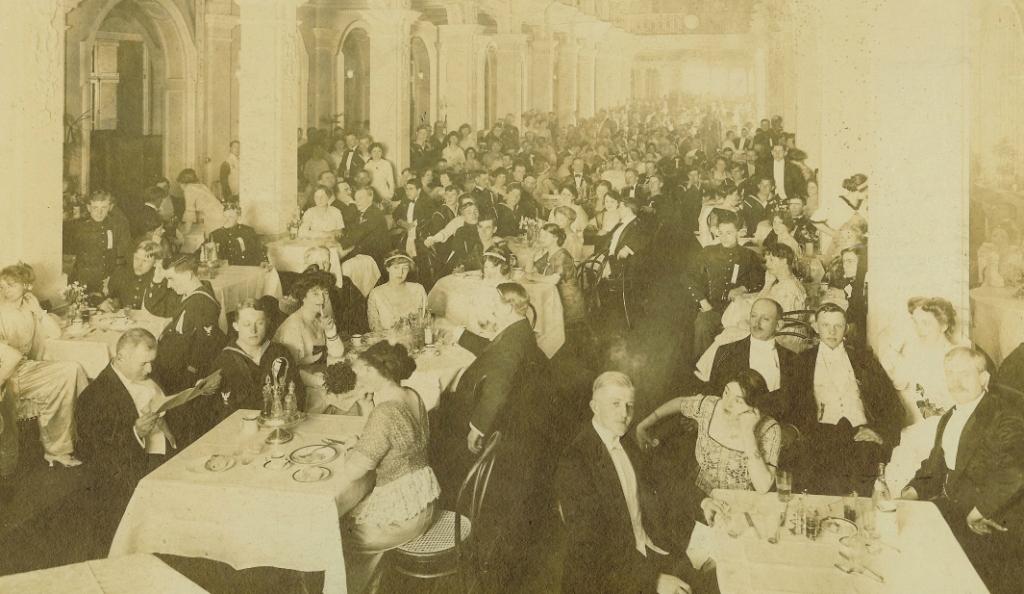
Mairnes, sailors and civilians mix at a Navy Day Dinner, Hotel Astor, Shanghai, pre-WWI